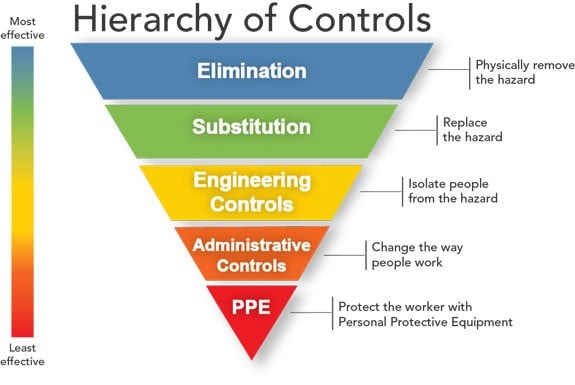The science is indisputable. All three types of fatigue, whether physical (body), mental (mind), or neurocognitive (brain), impair human performance. The most insidious and dangerous form in workplaces is neurocognitive fatigue, which is caused by insufficient Delta-wave or deep, restorative sleep that the human brain requires every 24 hours. The particular parts of the brain that suffer from this type of fatigue are the four lobes of the cerebral cortex—the parts of our brain that control cognitive processes such as pattern recognition, auditory discrimination, visual processing, memory, speech, reasoning, planning ahead, problem solving, and decision making.
The Dangers of Brain Fatigue
Jan 13, 2021 11:17:04 AM / by DEKRA posted in Serious Injury and Fatality, safety, organizational safety, DEKRA, workplace injuries, Crisis, Workplace safety, Driver Safety, Road Safety, safety leadership, fatigue
Top 10 Workplace Safety Whitepapers and eBooks
Jan 7, 2021 3:01:11 PM / by DEKRA posted in Serious Injury and Fatality, safety, organizational safety, DEKRA, workplace injuries, Crisis, Workplace safety, Driver Safety, Road Safety, safety leadership
How do you get better at safety? Especially in 2020 where in-person learning was practically impossible? In our experience, the answer depends on where your organization is on its safety journey. For some, there’s a need to develop safety leadership skills in supervisors. For others, the solution is broader exposure control, targeted risk management, remote learning or serious injury prevention. Still, others need a combination of all the above.
Taking Charge of Exposure
Dec 21, 2020 2:37:05 PM / by DEKRA posted in Serious Injury and Fatality, safety, organizational safety, DEKRA, workplace injuries, Crisis, Workplace safety, Driver Safety, Road Safety
Employees face hundreds of exposures every day. These exposures can be as seemingly innocuous and commonplace as an uneven floor or a dimly lit workstation. They can be in the way people are encouraged to work by an organizational culture that hurries them to complete a job or turns a blind eye to shortcuts that keep production flowing. They can be remarkable for their lack of protective measures: machinery with faulty or missing guards, elevated tasks with no handholds or tie-offs, jobs with no clear procedure for working around chemicals or hazardous material.
Drowsy Driving? An Accident Waiting to Happen
Dec 14, 2020 5:01:28 PM / by DEKRA posted in Serious Injury and Fatality, safety, organizational safety, DEKRA, workplace injuries, Crisis, Workplace safety, Driver Safety, Road Safety
Contain Your Risk! Safety Reminders for Unloading Shipping Containers
Dec 14, 2020 9:32:57 AM / by DEKRA posted in Serious Injury and Fatality, safety, organizational safety, DEKRA, workplace injuries, Crisis, Workplace safety
Unloading shipping containers isn’t quite as easy as unloading groceries from your car. Workers must be aware of the many safety hazards that await them if done haphazardly. What are these hazards and what can an organization do to mitigate the risk of injury or worse?
Workers involved in the loading and unloading of containers should be appropriately trained in how to avoid risks such as:
Rewarding Workers for Safety – the Right Way
Nov 17, 2020 8:52:11 AM / by DEKRA OSR Communications posted in Serious Injury and Fatality, safety, organizational safety, DEKRA, workplace injuries, Workplace safety
Have you ever noticed a sign posted in a workplace stating, “this department has gone 365 days without an on-the-job injury” Would you assume that this is a really safe company? Or do you think there’s a catch behind the claim? Are they safe because they are doing the right things to prevent injury or are they lucky?
Understand Your Exposure: Classifying Serious Injury and Fatality Potential in the Utility Industry
Nov 3, 2020 9:27:04 AM / by Kathy Culig, PhD, Principal Consultant & James Grant, VP- Utilities Leader posted in Serious Injury and Fatality, safety, organizational safety, DEKRA, workplace injuries, Crisis, Utilities, Workplace safety
Imagine that a team of utility workers is using a personnel lift to replace a large, heavy transformer. While taking down the old transformer, a rusted fastener breaks and the transformer falls, striking the ground. The good news is that since the team recognized the risk of falling objects, they set up a huge safety zone on the ground to keep people away from the work area. They also wore their personal protective equipment (PPE) and tied themselves off to prevent falling. Because of the preventive measures that the team took, no one is hurt.
More Than Masks: Using the Hierarchy of Controls to Help Prevent Spread of COVID-19
Apr 17, 2020 1:19:49 PM / by DEKRA OSR Communications posted in Serious Injury and Fatality, safety, organizational safety, DEKRA, workplace injuries, Opiod Crisis, COVID-19, Crisis
Six Tips to Enhance Workplace Safety During the COVID-19 Crisis
Mar 20, 2020 7:00:00 AM / by DEKRA OSR Communications posted in Serious Injury and Fatality, safety, organizational safety, DEKRA, workplace injuries, Opiod Crisis
In the rapidly changing environment caused by the COVID-19 virus pandemic, leadership needs to access the latest reliable information and communicate with employees about steps being taken to stop the spread of the contagion. The pandemic has changed workplace safety, introducing significant stress and uncertainty. This can result in leaders doing fewer high-quality safety activities, because they are concerned they can’t answer the most pressing questions. Employee stress increases the probability of distraction when situational awareness is most needed.
Use Effective Safety Leadership Practices to Help Prevent Burn Injuries
Feb 14, 2020 8:00:00 AM / by DEKRA OSR Communications posted in Serious Injury and Fatality, safety, organizational safety, DEKRA, workplace injuries, Opiod Crisis
On June 3, 1991, the Colorado Department of Health (CDH) was notified of a work-related burn sustained by a 20-year-old employee of a fast-food restaurant. The employee had been following the restaurant's standard procedure for cleaning exhaust filters located approximately five feet above a deep fryer. She had placed a wooden cover over three of the fryer's four bins, all four of which contained hot grease; no cover was available for the fourth bin. While standing on a chair she had placed on the wooden cover to reach and remove the filters, she fell, sustaining second- and third-degree burns over 10% of her body when she immersed her arm and shoulder in the hot grease contained in the uncovered fourth bin. She was hospitalized for 4 days and later required plastic surgery for scarring.(1)


